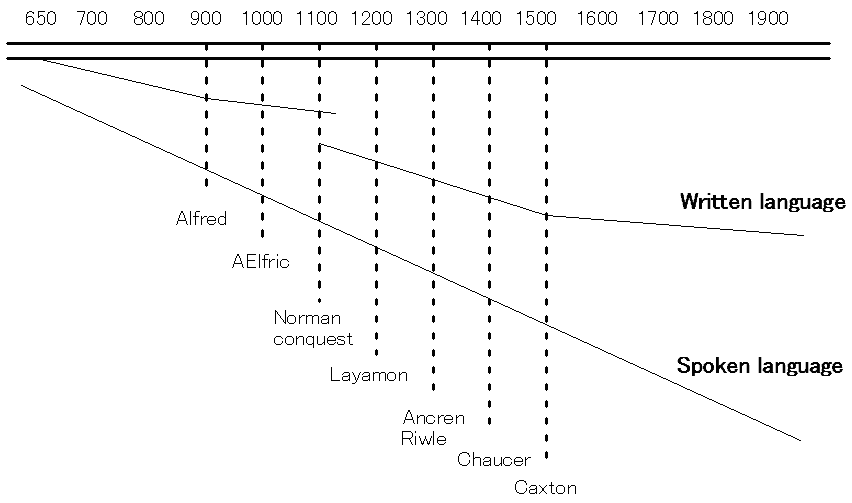Curzan の規範主義に関する著書を読んでいて,英語史における書き言葉と話言葉の距離感についての Hockett (1957) の考察が紹介されていた (Hockett, Charles F. "The Terminology of Historical Linguistics." Studies in Linguistics 12 (1957: 3--4): 57--73.) .以下の図は,Curzan (55) に掲載されていた図に手を加えたものなので,Hockett のオリジナルとは多少とも異なるかもしれない.図に続けて,同じく Curzan (55--56) より孫引きだが,Hockett の付した説明を引用する.

With Alfred, the 'writing' line begins to slope downwards more gently, becoming further and further removed from the 'speech' line. This is because Alfred's highly prestigious writings set an orthographic and stylistic habit, which tended to persist in the face of changing habits of speech. The Norman Conquest leads rather quickly to an end of this older orthographic practice; the new 'writing' line which begins approximately at this time represents the rather drastically altered orthographic habits developed under the influence of the French-trained scribes. I have begun this line somewhat closer to the 'speech' line at the time, on the assumption --- of which I am not certain --- that the rather radical change in writing habits led, at least at first, to a somewhat closer matching of contemporary speech. From this time until Caxton and printing, the 'writing' line follows more or less inadequately the changing pattern of speech, never getting very close to it, yet constantly being modified in the direction of it. But with Caxton, and the introduction of printing, there soon comes about the real deep-freeze on English spelling-habits which has persisted to our own day. (Hockett 65--66)
この図と解説は,せいぜい20世紀半ばまでをカバーしているにすぎないが,その後,20世紀の後半から現在にかけては,むしろ書き言葉が colloquialisation (cf. 「#625. 現代英語の文法変化に見られる傾向」 ([2011-01-12-1])) を経てきたことにより,少なくともある使用域において,両媒体の距離は縮まってきているようにも思われる.したがって,図中の2本の線をそのような趣旨で延長させてみるとおもしろいかもしれない.
書き言葉と話し言葉の距離という話題については,「#2292. 綴字と発音はロープでつながれた2艘のボート」 ([2015-08-06-1]) や「#15. Bernard Shaw が言ったかどうかは "ghotiy" ?」 ([2009-05-13-1]) の図も参照されたい.
・ Curzan, Anne. Fixing English: Prescriptivism and Language History. Cambridge: CUP, 2014.